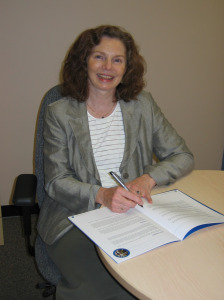by Christina Wilson, Head Editor, INALJ Alberta
Managing Your References Team: a necessary soft skill
 At some point in your quest for the perfect position, you will be asked to provide references. I think of my references as my team. They are a trusted group of colleagues who know my work style and achievements and are able to communicate clearly and concisely, whether by telephone or by email. This latter is very important, as your references’ abilities to communicate will reflect upon you during this part of the interview process. My team is large and covers a range of work relationships. It includes co-workers, those I’ve supervised and my supervisors. The range of relationships ensures that I can provide references that are peers, colleagues or supervisors so that I can be prepared for what the interview process requires. Typically, interviewers want to validate your work style and qualities and prefer a supervisor to provide this information. But if the job requires team work and coaching, your peers can provide a better reference. If interviewing for a Library Director position, where the interviews are being conducted by a consultant or by a Library Board selection committee, references that have been Library Board members are more compelling.
At some point in your quest for the perfect position, you will be asked to provide references. I think of my references as my team. They are a trusted group of colleagues who know my work style and achievements and are able to communicate clearly and concisely, whether by telephone or by email. This latter is very important, as your references’ abilities to communicate will reflect upon you during this part of the interview process. My team is large and covers a range of work relationships. It includes co-workers, those I’ve supervised and my supervisors. The range of relationships ensures that I can provide references that are peers, colleagues or supervisors so that I can be prepared for what the interview process requires. Typically, interviewers want to validate your work style and qualities and prefer a supervisor to provide this information. But if the job requires team work and coaching, your peers can provide a better reference. If interviewing for a Library Director position, where the interviews are being conducted by a consultant or by a Library Board selection committee, references that have been Library Board members are more compelling.
Picking your team of references can be time consuming, so provide yourself with lead time and contact them in advance. Let them know what you’ve applied for, why you feel you’re perfect for the position, how their relationship with you supports these qualities/skills and some approximate timelines for the interview. This latter is very important for you may need to substitute a team member due if timetables do not mesh. As an interviewer, I’ve asked applicants to ensure that their references are available for reference checking during a particular time, to match our interview timelines. You may be asked to do the same, so ensure that your references are aware of when a call might come and ensure that you have their accurate contact information.
When submitting your reference list, provide relationship details, even if you are not asked. This demonstrates your organization skills and allows you to reinforce some of the skills highlighted in your resume or covering letter. Here’s a sample: (I made up the name to protect privacy)
“Professor Cantelope, PhD, School of Library and Information Sciences, Western Maritime University, London, Ont.
Email: ccantelope@uwmto.ca 555-555-6780
Dr. Mustard was my professor for three classes, Reference, Research Skills and Statistical Analysis. She can speak to my strong academic standards and quality work completed on individual and group assignments. Dr. Mustard was my academic advisor for my major paper, ‘Digital Libraries’ which was selected for presentation at the SLIS Forum for Information Professionals, January, 2013.”
Now that you’ve got your full reference team, keep them updated as part of your ongoing career management process. This means communicating with them from time to time in person, via email or over the telephone. You cannot guarantee that everyone reads your updates on LinkedIn, Facebook, Twitter and other social media sites as assiduously as you post them. Moreover, keeping your team informed is a professional courtesy owed to your reference team for providing you with a professional favour. Make it easy for them to speak well and accurately of you in regards to your career, achievements and other professional activities. Typically reference checking takes place after the first interview, providing you with additional information to pass along to your references in support of your attributes for the position being sought. This also encourages your reference team members to contact and provide their impressions of how the reference checking went and how they felt you were being perceived.
I find that conferences, social events, meetings are great opportunities for keeping my reference team in the loop. It’s also a time to begin recruiting additional members of the team. These personal contact points offer the chance to thank my reference team through other gestures such as buying them a refreshment, lunch or dinner. Volunteers can never be thanked enough for their time, ideas and effort. Thanking them appropriately is more than a courtesy. It’s their due! It also helps you both model, and practice, excellence in working with people. It’s a “soft skill” that goes a long way in any career.